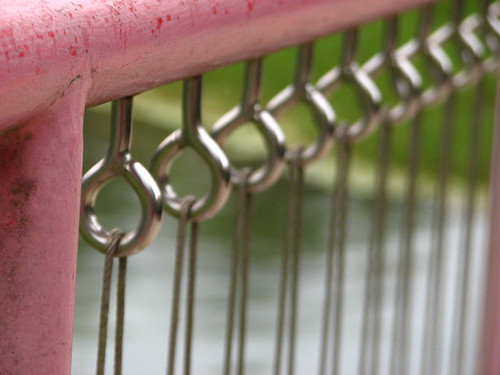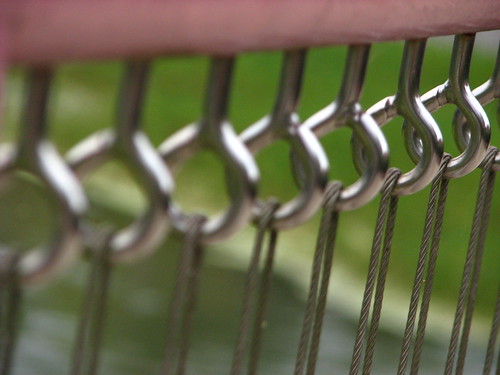The One Who Sees Me...
Our dear sister, Karen, preached a sermon at our church this week. Karen and her family live and work in Morocco, and we are blessed to count them as part of our extended church family.
This sermon - which begins with the difficult, painful biblical story of Hagar and moves on to the difficult, painful story of women forced into prostitution in Africa - is one of the most difficult, challenging sermons I've heard in a while (and we hear difficult and challenging sermons all the time, so that's saying something). Read with caution...
Hagar’s story is one of many poignant and painful stories of women in Hebrew scripture. It’s a tale in which we see how flawed our forebears in the faith could be (and believe me I'm grateful for that, because it reminds us how real they are). But the story is hard: Sarah is spiteful and cruel; Abraham is passive and weak. And even Hagar in the first scene comes off arrogant and proud (though that judgment from Sarah and the narrator makes me raise my eyebrow, as if one said she was acting a bit “ high and mighty” for a slave).
And though the Genesis story is ultimately redemptive, in Christian tradition Hagar’s legacy is tainted by Paul’s disparaging metaphorical use of her story in Galatians – we are children of the free woman and not children of the slave woman. Ugh. Why did he have to say that? The stigma of slavery sticks to her as if she were to blame for the injustice of her lot in life.
But Muslims don’t have that baggage. Hagar is a faith hero in Islam, even if, interestingly enough, her name, her story doesn’t show up in the Qur’an. (By the way, did you know that Mary the mother of Jesus is the only woman named in the Qur’an?) Knowledge of Hagar’s story is nonetheless assumed. And it is told, dramatically, every year as pilgrims on hajj reenact Hagar’s frantic search for water among the hills of Safaa and Marwa right outside of Mecca, running back and forth between them seven times.
In fact, this is actually going on right now, as well, as faithful Muslims gather in Mecca to perform the umrah – which is not the official hajj that can only take place during the month of hajj but performing the rites of the hajj during the month of Ramadan; Ramadan is not simply a time of fasting, but a time of intentional remembering one’s need for God and intensely seeking God with all one’s heart.
Hagar didn’t have to try to remember that she needed God. Hagar, as a female slave, was sexually (and every other way) exploited, a foreigner in the service of a nomadic family, themselves strangers in a strange land; she was the lowliest of the low. Muslim tradition says she was given to Sarah by Egypt’s pharaoh while Sarah was kept in his harem. Hagar lived completely at the mercy of those who possessed her; she had no one to turn to when she was in need or distress.
So when she can take Sarah’s harsh treatment no longer, Hagar reaches out to … no one; she simply runs away. It is the angel of the Lord who reaches out to her, who seeks Hagar and finds her beside a spring in the wilderness. There God’s angel calls her by name, encourages her, and blesses her – giving her a blessing not unlike the one promised to Abraham: "I will so greatly multiply your offspring that they will be too numerous to count."
And just so she will never forget God’s promise to her, the angel tells her to create a memorial – not to pile up a bunch of rocks like guys did – but to commemorate God’s faithfulness to her by giving her child the name Yshma el – ysmah allah we would say in Arabic – God hears.
Now, Hagar, who was not accustomed to being addressed by the divine and who does not know the protocol, decides to return the blessing to God. Even as God names her child, she names God. She's the first person in scripture to do so, saying, you are “El Roi”, God who sees. And she is right. God sees her. God hears her. She is not alone. God is with her.
But what happens next? She goes back. To Sarah. To slavery. Encountering God did not solve her problems. No quick fix. No solution in sight for the foreseeable future. Just a promise. A name. An experience to cling to (and maybe a sping of water to visit) when things got rough.
Over the past nine months, I have met a lot of women who could be called Hagar. Though more often than not, they are called Blessing, Precious, Praise, Grace, Gift, Glory, Beauty, Esther. They are sub-Saharan African women, mostly Nigerian, whose experience resonates with that of Hagar.
While they are not officially slaves, they are all caught up in a human trafficking network that has forced them into prostitution (explicitly so or de facto) in Morocco. I first realized the extent of the problem last October when I visited the women in makeshift camps in Oujda and heard from a young woman named Sarah, interestingly, of Medicins sans Frontieres that virtually all of them were either already part of a network trafficking women to work as prostitutes in Europe or were exchanging sex for protection and food, hooking up with men to survive as they sought to fulfill their families or tribe’s hopes by finding work in Europe.
Almost all of the Nigerian women have taken a “juju oath” that binds them to fulfill their obligation to the people who are paying to transport them to Europe, which means working as prostitutes until their debt is paid off. The vast majority come from oil-rich, corruption-rife Edo State in the Niger delta which is “ruled” largely by gangs and warloads that regularly wreck havoc on the population, not to mention the environment. A BP gulf-sized oil spill occurs every year in the Niger Delta, every year for the past 50 years, and virtually nothing is being done to make a change because the powerful profit all around, not least among them American and European oil companies.
It’s no surprise that this region has become rife for human trafficking. Scandalously, several Western journalists reported in 2011 that evangelical Christian pastors in Edo State had been roped into the network and took part in convincing girls that it was God’s will for them to sacrifice themselves in this way for their families and communities.
Sarah explained to us back in October that it was terribly difficult for women to get out even when they decided they wanted to and were willing to risk breaking their juju oaths. They have no place to go. And the Nigerian men who run the circuits threaten physical violence or death to them and to those who help them...



